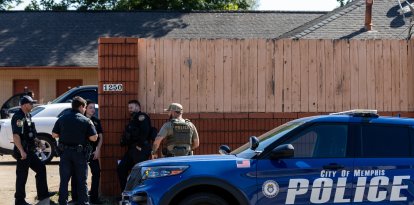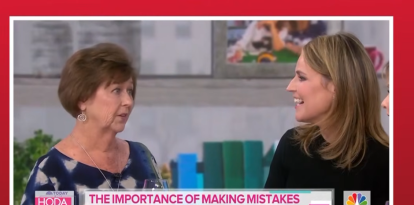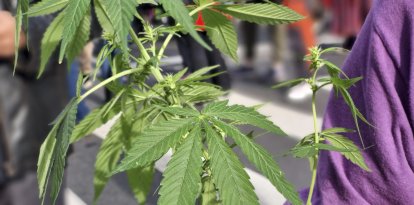BLM's decline: Marxist roots, corruption allegations and extreme violence
The Black Lives Matter movement's favorability has fallen as much as 15% from its peak of popularity following the death of George Floyd in 2020.

(Cordon Press)
A little more than a decade ago, a six-woman jury acquitted George Zimmerman in the death of Trayvon Martin, a black teenager. The verdict - "not guilty," for the vigilante charged with second-degree murder and manslaughter - closed the judicial process, but set in motion another one that extends to today: Black Lives Matter (BLM).
The movement born as a hashtag (#BlackLivesMatter), and solidified in several organizations, reached peaks of relevance in the public agenda after cases such as Michael Brown in 2014, and George Floyd in 2020. Although BLM reached its zenith with the latter, only three years later the health of the movement shows signs of deterioration unthinkable until recently.
The fall in popularity portrayed by polls is one of those symptoms: its rejection has increased by 15% since 2020. Or so is demostrated by a survey from the Pew Research Center, which also revealed that only 8% of Americans believe that Black Lives Matter improved the lives of the black population. Only 7% believe that it improved race relations and 14% that it increased police accountability.
The same is evidenced by YouGov data, which showed a 13% drop in popularity from its peak of 47% support in the first four months of 2021. A Civiqs poll, meanwhile, picks up that support for the movement has slipped back to similar figures from 2017. A net -3%, with 44% opposed and 41% support among American voters.
What's behind this plunge in the polls? Might this downward trend lead to the end of BLM?
In the spotlight
BLM demonstrations following the death of George Floyd in 2020 brought the movement into the spotlight. The Armed Conflict Location & Event Data Project (ACLED) recorded more than 7,750 protests linked to the movement, spread across more than 2,440 locations nationwide between May and August.
"Riots are turning people off BLM," wrote columnist James S. Robbins after the death of Jacob Blake, another case that flooded the streets with the BLM acronym. Only months after Floyd's demise, -Floyd died May 25; Blake, Aug. 23- the movement was showing signs of exhaustion.
As evidence, Robbins cited the Civiqs poll, which recorded a 10% drop. Even then, he argued, net support among whites was negative and independents had reduced their favor to 3%, down from before Floyd's death.
The dean of the Institute of World Politics explained that despite the media's insistence that violence had taken root only in a minority of the demonstrations -less than 220 locations, according to ACLED-:
In some cases, this insistence by the press crossed, he assures, the limits of absurdity:
This growing opposition also translated into counter-protests, some with violent encounters. According to ACLED:
Faces of the organization
"While only the deranged can take issue with the sentiment that black lives matter, the agenda of the organizations that have astutely appropriated that slogan is far different," wrote Mike Gonzalez, author of BLM: Creating a New Marxist Revolution.
A series of revelations about the ideology carried by the organizations that coin the movement's name may be another reason behind the decline in its popularity. In Gonzalez's terms:
"We actually do have an ideological frame. Myself and Alicia (Garza) in particular are trained organizers. We are trained Marxists. We are super versed on sort of ideological theories." That phrase from Patrisse Cullors, co-founder of the BLM's largest organization, BLM Global Network Foundation, was one of the examples widely circulated as evidence of that 'not-so-hidden agenda'. It was in 2015, during an interview with The Real News Network.
Another BLM Global Network founder Opal Tometi - now Ayọ Tometi, in "honor of her Nigerian heritage" - argued that "it’s great to see that people now understand that when we say 'Black Lives Matter,' we're not just talking about police brutality," before arguing for reparations.
Tometi was also criticized for her ties to the Venezuelan dictatorship. In 2015 she traveled to Venezuela to meet with Nicolás Maduro:
"In a significant blow to the progressive and most impoverished sectors of Venezuela – working-class, Afrodescendant and indigenous people – and to global allies, the counter-revolutionaries won control of the National Assembly," which can be read in a venezuelanalysis.com article signed by Opal Tometi after the opposition's victory in the 2015 elections.
But BLM founders are not the only authors of similar controversies. The BLM Memphis affiliate, for instance, tweeted:
In an obituary to Fidel Castro, BLM Global Network defended his legacy, claiming it was their duty to "push back against the rhetoric of the right and come to the defense of El Comandante." "As Fidel ascends to the realm of the ancestors, we summon his guidance, strength, and power as we recommit ourselves to the struggle for universal freedom. Fidel Vive!."
Movement for Black Lives (M4BL), another organization associated with the movement, publicly professes more radical positions: the movement was criticized for opposing the "Western-prescribed nuclear family structure." Although the web page with these statements is down - according to reports, it was taken down after the controversy - after a search on WebArchive, Voz Media was able to verify the presence of these statements in the entry "what we believe" in 2019:
Hawk Newsome, president of the New York chapter of BLM, was also accused of forming 'Peace Officers' who, while armed, would patrol black communities to confront security forces if they perceived cases of brutality. This was Newsome's own assertion in an interview with the Daily Mail:
Divide and lose?
Disunited and at odds. This is how the two largest organizations of the movement find themselves, after the schism of some thirty branches from which Black Lives Matter Grassroots was born. With these words the latter explains it in its 2021 annual report:
But the split wasn't just over differences on how best to continue militating: in 2020 BLM Grassroots sued BLM Global Network head Shalomyah Bowers for allegedly diverting $10 million in donations to cover her own expenses.
As Voz Media reported at the time, the leaders of the original organization criticized their plaintiffs and accused them of "being victims of the prison logic and social violence that fuels the legal system."
The Los Angeles Supreme Court agreed with BLM Global Network, which celebrated the ruling of the magistrate -"an impartial and thoughtful Black"- and extended -at least on the surface- an olive branch:
The response of the new BLM was less conciliatory: "Black Lives Matter Grassroots is Black Lives Matter." That is how its co-founder, Melina Abdullah, commented on the court decision, and she has maintained the same tone on her social networks:
Another, perhaps definitive, sign of the separation between the two institutions is that the local chapters grouped into BLM Grassroots registered as a nonprofit organization with the IRS, so it can accept donations on its own.
Funding
Patrisse Cullors, co-founder of BLM Global Network, stepped down as executive director in May 2021 after it became known that she had a housing portfolio valued at more than $3 million. This financial scandal was followed by the indictment (previously explained) of BLM Grassroots to Cullors' successor.
In May of this year, two federal filings also came to light showing that BLM Global Network allocated only 33% of the donations it received to charitable foundations. That would be just over $30 million of the nearly $90 million it received between 2020 and 2022.
Among the beneficiaries were Cullors' supporters, such as her brother Paul, and the Tamir Rice Foundation, one of the most critical of the co-founder's management.
Adding to the allegations of corruption was the specter of financial bankruptcy. The largest organization, BLM Global Network, closed its last fiscal year with a deficit of up to $8.5 million.
These red numbers were attributed to a decrease in donations - 88% between 2021 and 2022, according to an independent analysis -, poor management decisions - it would have lost at least one million dollars after the sale of some assets - and the misuse of funds.
This despite the fact that BLM Global Network had contributions from companies such as Coca-Cola, Axe and Universal Group, according to a database compiled by The Center for the American Way of Life at the Claremont Institute. (It was also accused of moral blackmail and lobbying for donations).
Beyond banners (and organizations)
"One should by no means assume that BLM has been defanged or has lost influence," asserts Mike Gonzalez, author of BLM: The Making of a New Marxist Revolution. "There is no need to riot at this point, given how far BLM has transformed the nation already."
To predict - or attempt to predict - the future of BLM, one must distinguish between its organizations and its ideology. The latter is part of an intangible legacy that González summarizes, in his text, as the idea "that America is systematically racist and oppressive" -which has even "convinced the leaders of elite institutions."-
"Our children are now taught that America is oppressive and inherently racist" Gonzalez exemplifies to Voz Media. "Our adults have to undergo struggle sessions at work, and our Administration, in the conduct of its domestic and foreign policy, is obsessed with weird racial and sexual ideologies, all largely due to BLM."
But will this influence last, and where will BLM be in the next ten years? That, says González, is the question of the moment.

























